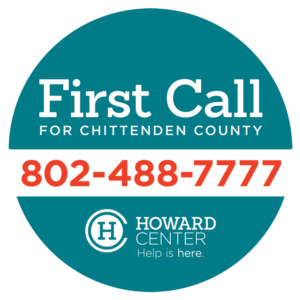
Without community there is no liberation.
But community must not mean a shedding of our differences, nor the pretense that these differences do not exist. It is not our differences that divide us. It is our inability to recognize, accept, and celebrate those differences.
– Audre Lorde

Print Howard Center’s Pride Flag (8.5″ x 11″) >>
Howard Center’s Pride Flag (11″ x 17″) >>
The Origins and Current work of Diversity, Equity, and Inclusion at Howard Center
View 2024/2025 Program Calendar
Howard Center established the Diversity Coordinator position in 2006. In 2015, Howard Center contracted with Abundant Sun to help collect and analyze demographic data. The same year, Diversity, Equity, and Inclusion (DEI) was integrated into the overall Strategic Plan and became accountable to the Board of Directors. In 2017, DEI was formally recognized as a department. In 2022 the organization hired its first DEI director and now runs a department comprising the director, manager, and coordinator of Diversity, Equity, and Inclusion.
Today, the Diversity, Equity, and Inclusion Department implements key initiatives both within and beyond the Howard Center community:
- Four Employee Affinity Networks (i.e. the Disability Network, the LGBTQIA+ Network, the Multicultural Network, and People of the Global Majority).
- Bi-monthly Roundtable discussions open to all Howard Center employees, including: neurodiversity, psychiatric survivors, destigmatizing houselessness, trans affirming care and cultural compassion.
- Bi-monthly toolkits on topics such as: Juneteenth, intersectionality, microaggressions.
- Mandatory staff training on unconscious bias, inclusive language, and racial and cultural competence.
- Contributions to our free and open to the public Community Education Series.
- Participation in the local Pride Parade and regional conferences.
- Collaborative work with community partners.
- Policy and systemic advocacy within the agency.
- Collaborations with HR to ensure inclusive hiring, retention, and accommodation supports for staff.
Accessibility
We are committed to providing accessible care.
These are just a few ways we support accessible care:
- For those whose primary language is not English, we have in-person and remote translation options.
- For individuals with limited hearing and speaking abilities, our staff may rely on American Sign Language or technology to assist with communication.
- For clients who seek counseling, we offer individual and group options that focus on a broad array of client interests, needs, and goals and identities.
- The agency developed a Multicultural Liaison program that builds connection and trust with immigrant, refugee, and asylee populations around mental health, substance use disorder, and developmental services to improve care, access, and awareness.
Our work continues to be responsive to the needs of our constantly changing community.
COVID-19 Multilingual Resources
Land Acknowledgement
In Vermont, we occupy territory unceded by the Abenaki people and nations that made up the Wabanaki Confederacy.
We acknowledge the painful history of cultural erasure, genocide, and forced removal from this territory. We recognize the ongoing oppression of First Nation/Indigenous communities. We also acknowledge our African ancestors’ forced migration to this land.
With this acknowledgement and statement, we recognize and seek to heal the cycle of pain and trauma experienced by People of Indigenous and African heritage. Naming is part of the process; it isn’t enough.
We commit to our own reconciliation work.
Declaration of Racism as a Public Health Crisis
On July 16, 2020, Howard Center joined the Vermont Racial Justice Alliance, former Burlington Mayor Miro Weinberger, and more than 30 Chittenden County organizations to announce a community declaration of racism as a public health emergency.
We committed to the following action steps:
- Create a data dashboard system to identify health disparities and inform practice change within our agency’s clinical practice and recruitment plan.
- Advance recruitment strategies to racially diversify the Board of Trustees and senior leadership at Howard Center.
- Enhance training and support to address racist actions by those we serve (clients, students, patients).
- Demonstrate support for Black Lives Matter through an agency action initiative.
- Offer educational sessions on racism related to mental health, substance use, and developmental disabilities as part of our free and open to the public Community Education Series.
Moving Forward
We work to address historic harm while promoting a culture of accountability and well-being.
We dedicate ourselves to:
- Realize initiatives in current racial justice strategic plan.
- Build a subsequent, intersectional DEI strategic plan.
- Address ongoing harm through systems advocacy and staff support.
- Foster expansion of employee affinity groups.
- Develop robust DEI centered programming.
- Continue to create an educational curriculum that supports our staffs ongoing professional and consciousness-based skill development.
- Enhance strategies for inclusive hiring and staff retention.
- Cultivating trusting relationships across systems of care
Media Coverage:
VermontBiz: Howard Center taps Catarina Campbell for agency’s first DEI director
WCAX: Burlington to declare racism a public health emergency
Vermont Business Magazine: City, Chittenden County organizations declare racism a public health emergency
Seven Days: Burlington, community organizations declare racism a public health emergency
VTDigger: Burlington declares racism a public health emergency
VPR: Declaration of racism as public health emergency
Los Angeles Times: Vermont’s largest city declares racism a health emergency
U.S. News & World Report: Vermont City, groups declare racism a health emergency
“We are committed to a world without racism. With roots in social justice, Howard Center staff work each day to serve our community and strengthen diversity, equity and inclusion in our organizational culture and system of care. We look forward to joining together with our community partners to strategically and fully eradicate systemic racism throughout our community.”
–Catherine Simonson, LICSW, Chief Client Services Officer


